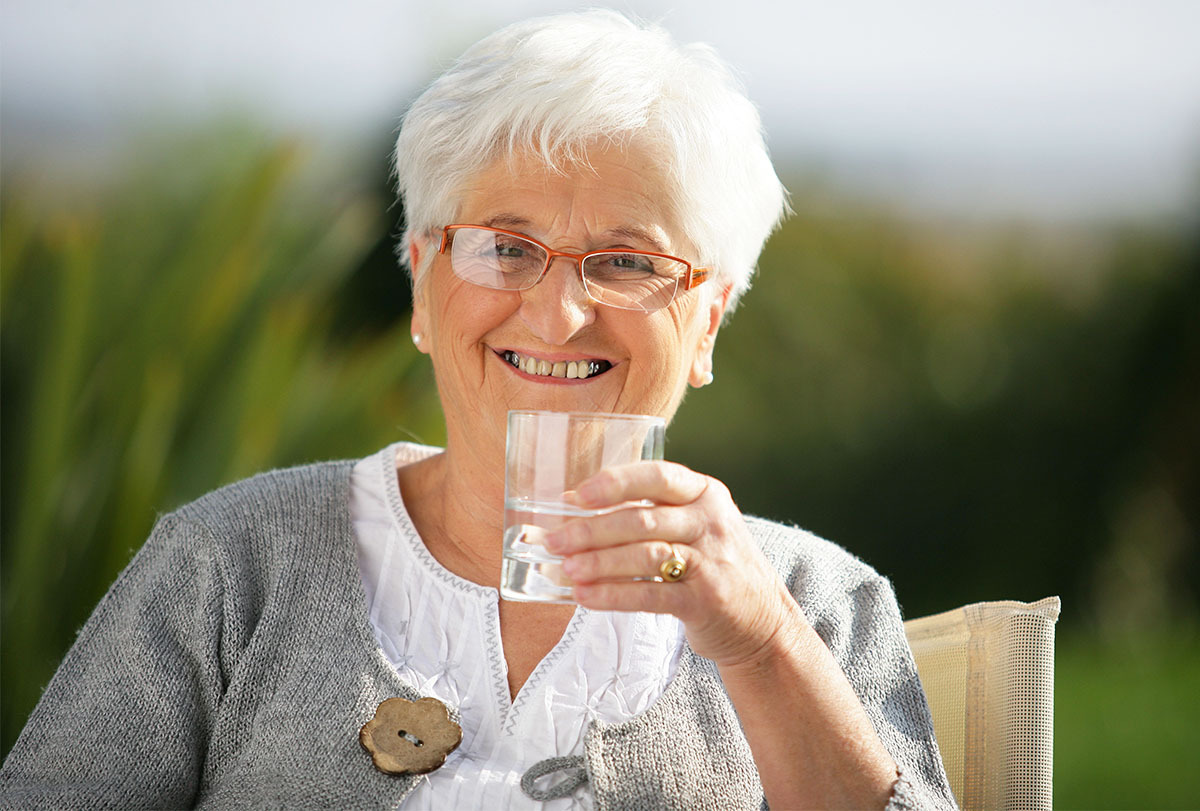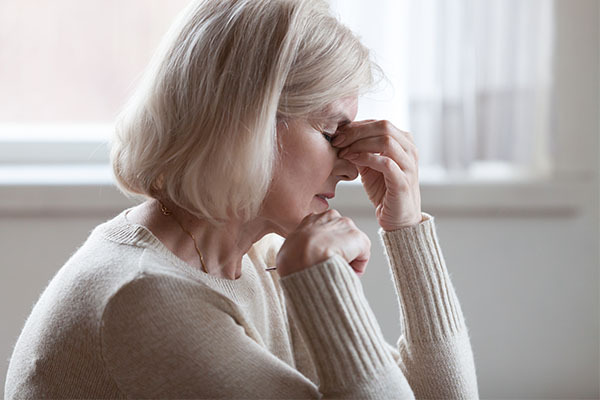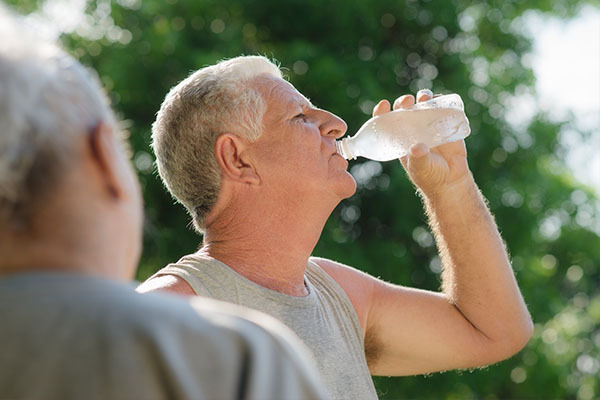In this article:
When most people think of dehydration, it is usually getting overheated after a long day of spending time outdoors in the sun, having diarrhea from a stomach bug, or competing in a rigorous athletic event without drinking fluids.

For very mild cases, a bottle of Gatorade may fix the problem. For serious ones, you may need a bag of IV fluids at an urgent care center. Dehydration in the elderly, however, is not as simple and its repercussions can cause serious damage.
Risk of Dehydration in the Elderly
The elderly have a higher risk of dehydration as the brain changes with age and isn’t as sensitive to the sensation of thirst anymore. Also, it becomes more challenging to stay hydrated because of the changes they experience in their golden years, such as the following:
- Joint pain may discourage them from making trips to the kitchen.
- Macular degeneration or cataracts can influence a decision between drinking more fluids or risking a trip and fall.
- Age-related kidney problems, such as inadequate functioning of the antidiuretic hormone vasopressin, can lead to decreased water reabsorption from the kidney into the circulation, leading to increased urination.
- The elderly are more susceptible to fluid loss in the summer.
- There may be an unrecognized fear of taking in too much fluid because of prostate problems or urinary incontinence.
- Infections become more frequent, and they are a cause and a result of dehydration (think of the common urinary tract infection).
- The elderly tend to take many medications that can cause dry mouth (Benadryl, pain medications) and excessive urination (diuretics for blood pressure), leading to further dehydration.
- A number of geriatric conditions (including dementia) can affect the physical process of swallowing.
According to the Journal of Health, Nutrition, and Aging, dehydration in the elderly is an actual cause of higher healthcare spending and is associated with an increased risk of dying while hospitalized. (1)
It is also linked with increased admissions to the ICU, readmission to the hospital, and the need to return to the hospital after being discharged. (1)
Symptoms of Dehydration in the Elderly

Symptoms of dehydration are not always obvious in the elderly. Mild to severe dehydration can be associated with thirst. However, this is not always the case as the sense of thirst typically decreases with age.
Patients usually report:
- Dizziness
- Headache
- Fatigue
- Difficulty moving
- Weight loss
- Weakness
- Dry mouth
- Decreased or smelly urine
A lack of moisture under the axilla (underarm), tenting, sunken eyes, and decreased capillary refill are more reliable indicators. The doctor may also notice a high heart rate, low blood pressure, cold, clammy extremities, and even confusion.
If not treated, these symptoms can progress to shock, kidney failure, falls, and heart failure requiring admission to the hospital.
Tips to Deal With Dehydration
Typically, one can recover from dehydration with aggressive fluid intake either by mouth or IV. Addressing the cause is also important and may require medication changes, antibiotics, or lifestyle modifications.
The causes of dehydration in the elderly are many and are not as easy to identify as it is in a healthy 20-year-old. As always, prevention is key. If your loved one is at risk of dehydration, you may do the following:
- Ask their doctor to review their medications and see if those that worsen or cause dehydration can be reduced or eliminated.
- If they are getting “thickened” fluids because of a problem with swallowing, request a trial off of the thickening powders as they turn fluids into distasteful honey or pudding consistency.
- If there is a problem with coordinating the movements required to get fluids to the mouth, request that an occupational therapist works with you and your loved one to discover mechanical or swallowing techniques.
- Creating a hydration regimen can also be very helpful and should be viewed in the same way as the non-negotiable pillbox that simplifies when prescriptions should be taken.
- Finally, if you are in the position of transferring the care of your loved one from home to a nursing facility, make sure to inquire what precautions the facility has in place to prevent dehydration.
Expert Answers (Q&A)
Answered by Dr. Michael Langan, MD

The Institute of Medicine of the National Academies of Science in the United States recommended a daily total fluid intake (water provided from beverages and foods) of 3.7 L (125 ounces) for elderly men and 2.7 L (91 ounces) for elderly women. (2)
In patients with chronic medical conditions such as congestive heart failure, fluid intake needs to be addressed on a case-by-case basis under the direction of a physician.
In an elderly person with dementia, dehydration can cause delirium, which is an acute state of confusion. This can result in lethargy, somnolence, and agitation.
The confusion caused by dehydration in someone with dementia should improve with hydration, and it does not worsen underlying dementia. (3)
Yes, severe dehydration can lead to a dramatic loss of electrolytes, which can also lead to delirium and, in some cases, hallucinations.
Dehydration so severe that it is producing hallucinations is a medical emergency, and the person should be brought to the hospital for treatment.
If the dehydration is mild, the symptoms should improve shortly after drinking sufficient fluids. If the dehydration is severe and IV fluids are administered, they should recover from most symptoms shortly after fluid replacement.
Yes, when the joints are hydrated, they move freely and with ease. However, when the joints are dry and dehydrated, they can become painful. The pain is due to a decrease in the synovial fluid.
The water content in the cartilage is regulated by proteins that become gel-like when they come into contact with water. Dehydration is one of the easiest causes of joint pain to treat.
Encourage older people to drink small amounts of fluids throughout the day rather than drinking large amounts all at once. You can set a benchmark of five 8-ounce glasses of water a day.
It is also important that family members and caregivers recognize the early warning signs of dehydration.
Final Word
Dehydration in the elderly is a real threat. With age, the brain’s sensitivity to thirst decreases. Moreover, old age is often associated with problems such as UTIs and forgetfulness that contribute to dehydration. However, elderly dehydration is certainly treatable and can usually be avoided with an ounce of prevention.
- Was this article helpful?
- YES, THANKS!NOT REALLY


